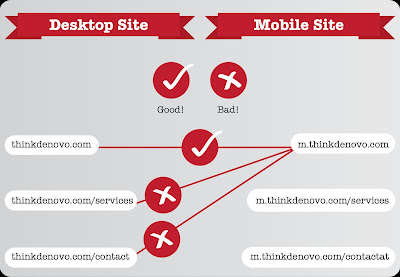Search Engine. What did you just think of? Odds are it was Google. According to comScore, an internet measurement firm, Google accounted for 66.5% of web searches. What does this mean? They’re the boss. Google can dictate the rules for the web and everyone is forced to follow (unless they’d rather opt for Bing, which only has 17.3% search share). On June 11th Google announced an upcoming change to how search will work on smartphones. Much like desktop usage, Google is the king in the mobile court as well, with 81% of mobile search traffic. If you have a website that just might be viewed on a mobile device, this effects you! If you think you can stop reading because this doesn’t pertain to you 1) You’re very wrong 2) You SEVERELY need some marketing consulting.
You won’t be completely shunned by Google if you don’t optimize your site for mobile users, but you will be bumped down in the rankings. If your competitors optimize on the optimization (see what I did there?) and you don’t, they’ll appear above you in the valuable Google Search real estate.
Things that will anger “The Google” and result in a lower search ranking:
Mobile 404 Pages. A 404 page is automatically populated by a website if the link is missing or the page just doesn’t exist. However, some sites will automatically direct you to a “fake” 404 page if you are using a mobile device. This is a loophole that allows the page to still be indexed, without having content. Consider this little loop tightened.
Generic Mobile Land Page. A common way to create a mobile site is to make a mobile optimized page for the whole site. When someone clicks a link to your site, they will automatically be directed to your mobile landing page, regardless of what link they click on. This can cause some agitation by users. Imagine you click a link to a news article that you wanted to read, only to be directed to a mobile landing page with the article nowhere to be found. An angry searcher is less likely to continue the search, meaning they won’t see Google’s Ads. Google isn’t going to reward you for angering their customers.
Flash. It has been rumored for years that Flash was going to die. This algorithm update is just one more nail in the coffin. Ironic considering Google was practically the one company trying to keep Flash alive. Adobe, Flash’s creator, even started diverting resources away from it. Flash has been completely disabled on most preinstalled mobile browsers, but users downloaded browsers, like Puffin, for a workaround that allowed them to watch flash videos. After the update, sites with Flash embedded videos with get a shove downward.
App Pushers. Have you ever been to a website that suggest you download their smartphone app for “better viewing”? Google suggests using an HTML image that links to the app store download, or using “Smart App Banners for Safari on IOS6.” These methods will not interfere with indexing and will keep you on Google’s good side.
Do you realize what this means for you? It’s time to stop avoiding the mobile site. A responsive website design would obviously be the best bet, but there are other 3rd party apps that will Band-Aid the situation well while your new site is created.


